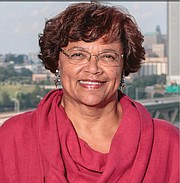City Council to take up affordable housing and homeless issues at Dec. 17 meeting
Jeremy M. Lazarus | 12/13/2018, 6 a.m.
Richmond’s governing body is planning to provide a $1 million increase to a City Hall loan pool that assists developers in generating affordable housing and to boost the city’s role in tackling the issue of homelessness.
The City Council also will consider requiring housing developers that receive city subsidies in the form of money or land to support apartment or home development to set aside at least 15 percent of any new units for affordable housing.
Approval of these items would represent victories for Councilwoman Ellen F. Robertson, 6th District, who has spearheaded the proposals.
City Council, which moved its next meeting to Monday, Dec. 17, because of this week’s snow, is expected to direct the $1 million increase to the city’s Affordable Housing Trust Fund, which provides loans to projects that seek to maintain current affordable housing or build new units.
The proposal is listed on the consent agenda, indicating that it has overwhelming support.
First cleared through the Land Use, Housing and Transportation Committee, the legislation calls for steering $1 million of the money the city collects from tax-delinquent properties to the AHTF, doubling the amount of money in the fund.
Ms. Robertson several years ago won council approval for an annual appropriation of $1 million to the AHTF, but has said that amount is too small and has ambitiously sought to find ways to create a far larger loan pool.
“If this fund is going to have an impact in meeting the need for affordable housing, we need to build it up to at least $20 million,” she told the Free Press.
She initially proposed to steer all of the funds above expenses collected from tax-delinquent properties that the City Attorney’s Office handled. In the 2017-18 fiscal year that ended June 30, the office auctioned 136 properties and had owners pay off past due taxes on 84 others, resulting in the collection of $5.9 million, including $1.7 million in legal expenses.
Separately, the council is scheduled to debate on Dec. 17 Ms. Robertson’s proposal to require apartment developers who receive direct city support to ensure that 15 percent of the residential units are “reserved for affordable housing.”
While the proposal cleared the Land Use committee, it moved forward without a recommendation for approval, remains controversial and is less certain of winning the crucial five votes needed to pass.
On the homeless front, Ms. Robertson, with help from others on council, also is poised to win her fight to require City Hall to come up with a strategic plan “to eliminate homelessness.”
Under Ms. Robertson’s proposal on the consent agenda, the city’s chief administrative officer would be required to develop and submit the city’s new homeless strategic plan to the council by Oct. 1, 2019, and to update it every two years thereafter. The CAO also would be required to report annually to a council committee, Government Operations, on the progress being made in carrying out the plan.
The legislation that Ms. Robertson is co-sponsoring with City Council members Andreas D. Addison, 1st District, and Kim B. Gray, 2nd District, is seen as increasing city involvement in dealing with the problem, rather than leaving the solutions to Homeward, CARITAS, Commonwealth Catholic Charities and other nonprofits that provide many of the services to those lacking shelter.
Under the proposal, the CAO would be required to create an inventory of available housing and shelters as well as information on the cost of each operation; provide a yearly assessment of the need and the cost to provide more shelters; set out goals and objectives for increasing shelters; and identify potential sites.
The CAO also would be required to recommend new standards or amendments to planning and zoning rules to allow, for the first time, development of shelters in various parts of the city.
The city’s zoning regulations currently are mostly silent on homeless shelters, Ms. Robertson said.
In addition, the CAO would be required to allow the participation of state, regional and Richmond nonprofits and residents in the development of the plan and provide council with a list of the participating organizations and residents.
In addition, the plan would have to lay out for the first time policies, procedures and standards of service governing the provision of shelter in city-owned buildings.
The proposal also would require the CAO to provide the council within 45 days a schedule with specifics for creating the strategic plan and the expected completion date.
Ms. Robertson began pushing her idea after watching with dismay the ad hoc process that took place this year as the city sought to find a new location for the overflow shelter it has operated in recent years in the old Public Safety Building near City Hall.
First, Mayor Levar M. Stoney joined Commonwealth Catholic Charities in its unsuccessful effort to relocate homeless services into the up-and-coming Manchester neighborhood. Then, facing a deadline to get the shelter open, the shelter was located in a hard-to-reach building in Shockoe Valley across from the Richmond Justice Center.
Ms. Robertson said that she and the neighboring Eastview community were never consulted ahead of the decision to use the Annie Giles Community Resource Center, formerly the Conrad Center.
Both the CCC service center that failed and the current space for the city’s overflow homeless shelter are in her district. She said she got an earful from constituents who feel their neighborhoods are taking the brunt of the problem. They want other areas of the city to pitch in.
In her view, the city needs to take a leadership role in developing a holistic approach to services for those who lack shelter, rather than leaving it to the nonprofits that seek to provide individuals with a temporary place to sleep, with medical and dental care, with counseling and with help in finding work and a permanent place to live.








